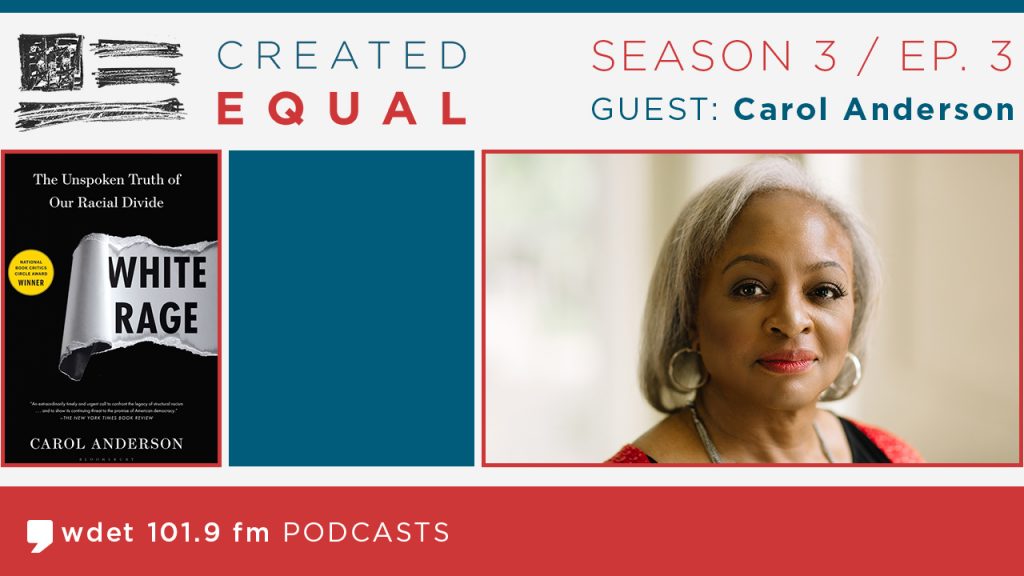Created Equal: Carol Anderson on the Lasting Implications of White Rage
Professor and author Carol Anderson explains how white rage has led to the systemic oppression of Black people in the United States.

Season Three of the podcast Created Equal explores “Writers on Race: From Ralph Ellison to Colson Whitehead,” and features some of the most important voices in literature as well as the national conversation on racial inequities.
The conversations were conducted on the radio program, Detroit Today, in the WDET studios on Wayne State University’s campus throughout the pandemic and civil unrest of 2020. Each episode consists of a conversation between Henderson and one writer exploring the role of their work in the conversation about race in America.
Subscribe to the Podcast
Apple Podcast – Spotify – Google Podcast – NPR One
Episode 3 Guest: Carol Anderson
Carol Anderson, is the Charles Howard Candler Professor of African American Studies at Emory University. Her research and teaching focuses on public policy and the ways in which policy intersects with issues of race, justice and equality in the U.S.
She is also the author of the New York Times Bestseller, “White Rage: The Unspoken Truth of Our Nation’s Divide,” which confronts the legacy of structural racism and depicts the long, enduring legacy of white rage in America and its catastrophic implications.
Discussion Points:
What “white rage” means to Anderson:
“I’m watching the television when Ferguson, Missouri was on fire, after Michael Brown’s murder, and the pundits were all talking about ‘Look at all of that Black rage. Look at people burning up where they live, who burns up where they live?’ And I lived in Missouri and I was shaking my head, saying ‘No, that’s white rage.’
We are so focused on the flames, that we miss the kindling. We miss the policies that drive people out into the streets. The kinds of policies that systematically undermine African American’s citizenship rights and undermine the advancement that African Americans have had toward their citizenship rights. That’s white rage. It’s quiet, it’s subtle, it’s bureaucratic, it’s legalistic. It’s happening in our legislatures. It’s happening in our Governors’ mansions. It’s happening in our school board meetings. In our zoning commission meetings. But those policies systematically undermine Black advancement.”
The historical context of the Great Migration:
“One of the things to understand ‘migration’ is that you have push-pull factors. The push factor was the lynching, the violence, the lack of education, the lack of civil rights, that was happening in the South. A level of precarity and vulnerability that was pushing Black people out. The pull factor was the rise of industrial jobs in the North. And the sense that one Black man talked about which was, ‘We’re going to be able to breathe freer.'”
How does America take strides to overcome racism and inequality?:
“It’s going to take some long hard work, and I think that’s what we’re seeing in this moment we’re in right now. Whites are realizing that the lives that they’re leading have led to such incredible vulnerability… The vulnerability of the coronavirus, and how badly that was mismanaged led to an economic crisis that has created hours-long lines to food banks and 40 million-plus unemployed. Then, seeing the state-sponsored violence raining down on Black folks that then eddies out to whites — what we’re seeing in Portland, what we saw in Buffalo, where the police just pushed down a 75-year-old white man and cracked his head on the sidewalk — that sense that something is wrong, the narrative that has been passed off as history but are actually myths, are causing a reevaluation, a reconsideration.”
Created Equal Season 3 is supported by the Michigan School of Psychology

Trusted, accurate, up-to-date
WDET is here to keep you informed on essential information, news and resources related to COVID-19.
This is a stressful, insecure time for many. So it’s more important than ever for you, our listeners and readers, who are able to donate to keep supporting WDET’s mission. Please make a gift today.

